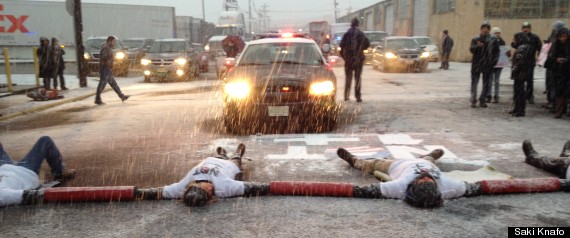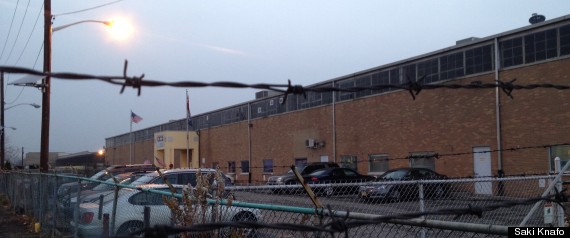
ELIZABETH, N.J. -- In his 24 years in the United States, Oscar Campos mostly stayed out of trouble. He worked hard, paid his taxes and took care of the rent and bills months in advance, so that he wouldn’t have to worry about the basics when his landscaping business slowed down for the winter.
He went to church every Sunday -- the same church where he married his wife 23 years ago. His idea of excitement involved stirring some melted chocolate into his coffee and catching a particularly titillating episode of "Caso Cerrado," Telemundo’s answer to "Judge Judy."
His mild manners served him well. Born in Mexico, he slipped across the border to San Diego in 1989 and continued to elude immigration authorities until 1995, when he tried to enter the country a second time after a visit with his parents and was caught and deported.
He returned to the U.S. a year later, once again crossing the border illegally. But over the next decade, as first the Bush and then the Obama administration ramped up the detention and deportation of undocumented immigrants, he grew increasingly fearful that he hadn’t seen the last of the immigration authorities. He hadn’t.
Three weeks ago, officers from U.S. Immigration and Customs Enforcement arrested Campos in the parking lot of an office building in central New Jersey and brought him to the Elizabeth Contract Detention Facility, a converted warehouse in the industrial swampland near Newark Airport. Every year, some 400,000 people pass through immigrant detention centers like this one. They make up the fastest-growing segment of the U.S. prison population.
The Elizabeth detention center, which holds up to 300 detainees at a time, is part of a nationwide system of immigrant lockups that have drawn criticism over the last four months, as activists in the immigration reform movement, frustrated by a lack of progress in Congress, have called on Obama use his executive powers to stop the detention and deportation of undocumented people. Just last week, the facility made news when eight demonstrators were arrested after blocking a road to the building, joining scores of other protesters who have been arrested at similar rallies around the country since September.
Although these demonstrators have been calling for an end to all deportations, many in the movement are especially upset that the administration is locking up and deporting people like Campos -- taxpaying parents of American children who pose no obvious threat to public safety.
“Deportations are breaking up families at a cost to taxpayers and at the risk of emotional and mental damage to young people who won’t forget how their parents are treated,” said B. Loewe, an organizer with the National Day Labor Organizing Network, one of the groups that orchestrated the Elizabeth demonstration. “Imagine what it’s like to go to bed at night knowing that the president has your dad in jail for no one reason other than that he came to this country to make sure you had a better life.”

Eight demonstrators were arrested after blocking access to the Elizabeth detention center in December.
Since arriving in office in 2009, Obama has pushed for legislation that would allow most of the country’s 11.7 million undocumented immigrants to remain here legally. But with a faction of House Republicans refusing to concede to the demands of reformers, the president continues to oversee the deportation of about a thousand immigrants each day, insisting that he has no choice but to enforce the law as it’s written.
Between 2005 and 2012, the rate of deportations doubled, and although it declined in the last year for the first time during his tenure, Obama has already overseen nearly 2 million deportations, outpacing any other president in U.S. history.
As deportations have increased, so have detentions. In 1994, the government detained 82,000 people. By 2011, the most recent year for which data are available, according to the Department of Homeland Security, that number had climbed to 429,000.
Some immigration activists and experts blame this rise on the political influence of companies like Corrections Corporation of America, or CCA, a major operator of private prisons, including the Elizabeth facility and other immigrant detention centers around the country. In the aftermath of the attacks of 9/11, the Bush administration shifted responsibility for immigration enforcement from the Immigration and Naturalization Service to the newly created Department of Homeland Security (Immigration and Customs Enforcement calls itself the "principal investigative arm" of DHS). Accordingly, private prison companies began boosting their spending on lobbying efforts aimed at influencing prison policy and securing government contracts.
By the end of the decade, Congress had adopted a law requiring ICE to keep an average of 34,000 people in detention at a time. As immigration officers worked to meet this “bed quota,” as the policy is known in Washington, the private prison industry profited. Between 2005 and 2012, CCA and The GEO Group, Inc., another giant in the private prison business, more than doubled their revenues from immigrant detentions, according to securities filings examined by The Huffington Post last year.
Steven Owen, the senior director of public affairs for CCA, said the company would not comment on government policy, but argued that the company’s facilities offer better conditions than county jails, which are also used for immigrant detentions.
"Our professionals are deeply committed to treating those entrusted to their care with fairness, dignity and respect,” he said. “We also understand and appreciate that our services are one of a number of solutions being considered and implemented by the government," he added.
One recent evening, sitting at a plastic table in the visiting room, Campos spoke about his time at the center through an interpreter. A small man with a neatly clipped mustache and a gentle manner, he said he spent his days watching TV, reading the Bible, exercising, talking with other detainees and worrying. He’d bonded with one of his cellmates, a Romanian father of two who had learned to speak Spanish fluently during his eight-month stay in the lockup.
Campos didn’t have any complaints about the facility -- though perhaps, as he suggested, this was because his physical state was not at the top of his list of concerns. He was depressed and fearful, preoccupied with the question of whether he’d ever be reunited with his wife and children. When he spoke about them, his voice cracked and he looked away. He said he felt guilty for subjecting them to such an ordeal.

The Elizabeth detention center houses up to 300 undocumented immigrants at a time.
Campos described his children as hard workers and good students, but he acknowledged that his youngest son, Erwing, 11, has been struggling in school since the day of the arrest. “He’s confused,” Campos said. “He doesn’t understand why I’m here.”
Campos is there in part because of an uncharacteristic risk that he took on the morning of Dec. 3. He was driving his wife to a routine visit with immigration authorities, as he did every month. As far as he knew, the authorities were either unaware or unconcerned that he’d returned to the country after being deported nearly two decades ago, but they were aware of his wife, Humberta, who had also reentered the U.S. illegally after being deported, and were allowing her to stay in the country as long as she checked in with them on a monthly basis.
On most of those trips, Campos parked at the back end of the lot, as far as possible from the office and the agents inside. But on that particular morning he was running late, so he drove right up to the entrance to the building, where anyone could see him.
A half hour passed as he waited for Humberta to emerge from the office, and then an hour. He began to wonder what was taking so long. Suddenly a van pulled up behind him, blocking his way out of the lot. He noticed the tinted windows, and that’s when the thought occurred to him: “It’s over.” He was arrested and brought to the lockup in Elizabeth.
Rosa Santana, an immigrant rights advocate with First Friends, a group that organizes visits with detainees at the Elizabeth center and other facilities, said it’s hard to know why the authorities detained Campos when they did. “We don’t know how they work,” she said. “It’s so random.”
Harold Ort, a spokesman for the New Jersey branch of ICE, said that ICE considered Campos a priority for removal because of his 1995 deportation. The agency is focused on the removal of "convicted criminal aliens, recent border crossers and immigration fugitives who have failed to comply with final orders of removal issued by the nation’s immigration courts," he said.
ICE is still reviewing the case, he added, noting that the agency "exercises prosecutorial discretion on a case-by-case basis."
Derek DeCosmo, the attorney who represents Campos and the vice chairman of the New Jersey chapter of the American Immigration Lawyers Association, questioned the fairness of detaining Campos instead of requiring him to report to an immigration office on a regular basis, as his wife is required to do.
"You’re talking about a deportation order that is 18 years old," he said. "In those last 18 years, what have you done here? You have had three kids born here. You’ve started your business. It’s a business you’ve paid taxes on. ICE might say he broke the law and is absconding, but from Oscar's perspective, that’s out of line.”
DeCosmo stressed that the decision is especially puzzling given that all three of Campos’ children were born in the U.S. In 2011, the Obama administration released a memo urging federal officers to avoid detaining and deporting otherwise law-abiding undocumented immigrants, especially young people and parents of children who are U.S. citizens.
This directive was reaffirmed recently by the newly confirmed Homeland Security Secretary Jeh Johnson, who said in a Dec. 12 letter, "in my view, immigration enforcement must be focused first on those who pose a threat to our national security, public safety and the integrity of our borders," rather than "low-priority" individuals who generally obey the law.
DeCosmo said he still meets many detainees who seem to fit the low-priority profile outlined in the Obama memo. “When something comes out of Washington, it doesn’t make its way down to the local office right away,” he said. “You’re dealing with bureaucracy."
Earlier this month, DeCosmo filed an application with ICE requesting a stay of removal for Campos. He hopes that ICE will allow Campos to remain in the U.S. until his oldest son, Oscar Jr., turns 21 in July, at which point Oscar Jr. will be eligible to apply for permanent residency status for his father. DeCosmo said he expects the government to make a decision soon.
In the meantime, the Campos family is trying to draw attention to Campos' case.
One morning last week, Campos' wife and children drove two hours from their home in Bridgeton, N.J., and held a prayer vigil and rally with some of their church friends in the falling snow outside the Elizabeth center. A church deacon and retired police detective named Arnaldo Santos led them in the Padre Nuestro, the Lord’s Prayer.
Santos said he was certain Campos was just the type of person whom Obama’s memo was meant to protect. “I was a detective for over 20 years,” he said. “I’m a good judge of character.”
Note: This article has been restored to its originally published version. A previous version was updated incorrectly with regard to the relative number of deportations under presidents Bush and Obama.
This story appears in Issue 86 of our weekly iPad magazine, Huffington, available Friday, Jan. 31 in the iTunes App store.